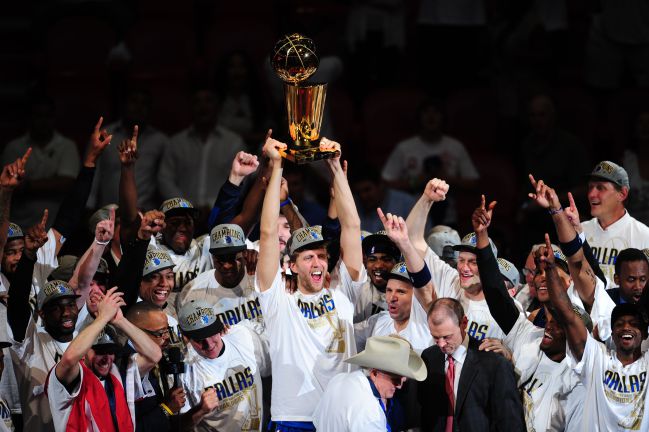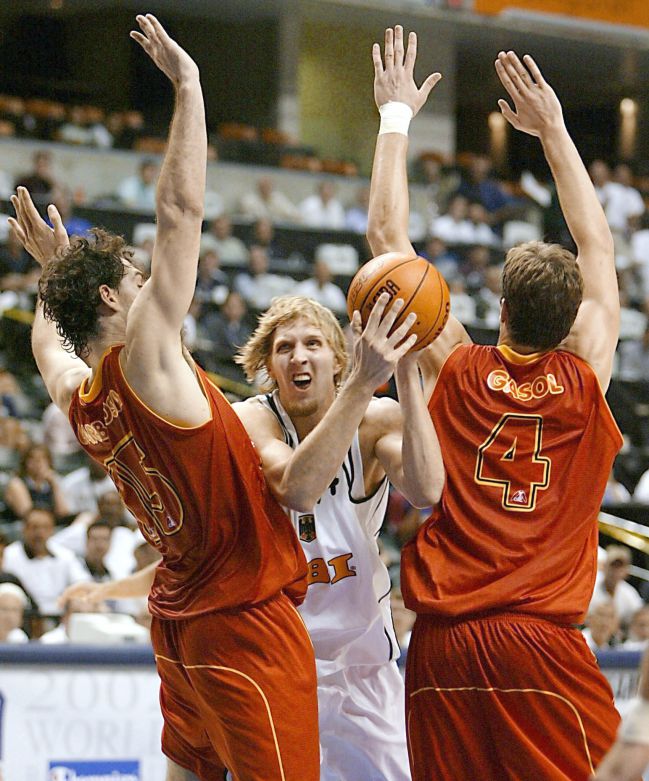By
In the edition of the Spanish Basketball Hall of Fame that coincides with the centenary of the Federation, the international demand is expanded. In the men’s category (in the women’s category the representation is for Natalia Zasúlskaya), in addition to a Predrag Danilovic united in flesh to this country thanks to Partizan de Fuenlabrada and its 1992 European Cup, this time one of the greats has been added superstars of this sport. Dirk Nowitzki gives that extra. Despite not having played in Spain during his career, there are many confrontations with the National Team that dominated the Golden Juniors at the beginning of the century. ANDidentity for a boy from Würzburg who changed the game from above.
It wouldn’t be the first and it definitely won’t be the last. Big men shooting from the three-point line regularly is now more constant than casual, but this was not even remotely the case when a hairy German who would reach seven feet (2.13 meters) began his basketball career. With an exquisite pedigree, given that his mother had played it and his father had excelled at handball, the path to the basket seemed simple. However, it was the tough tests that another former player, Holger Geschwindner, thought of for him, which forged that cyborg with the desire to break the millennium barrier.. Music to train, more ball than weights, a rowing exercise on a lake to wake up the body in the morning, Philosophy as support and, above all, a mathematical formula to optimize the shot: pressure with the fingertips, resistance during a match, wind blows and a 60 degree angle for perfection. That’s where the legend (of both) began.

Enlarge
Dirk Nowitzki, NBA champion.
MARK RALSTON (AFP)
In 1996, playing in the German second division, he already stood out enough for Dirk Bauermann, the later coach for eight years with Dirk’s generation, to name him “Germany’s greatest talent for the next 10-15 years”. He wasn’t wrong. Neither did Donnie Nelson, the son of the legendary Don and fundamental pillar of these Mavericks built around a German ephebe, when he discovered him at a Hoop Summit, a promotional event for boys who want to reach the NBA, during 1998 against talents with similar characteristics. in the power forward position (Rashard Lewis or Al Harrington, two of them) who had more call in the American circuits.
Nowitzki fell into 9th position in that year’s draft. He was transferred to Dallas via Milwaukee, which logically would regret that. The number one of that promotion was Michael Olowokandi, one of those whose impulse ended up fatally wounding. Also on the ramp towards heaven was the one from Würzburg, who with self-control to honor and the tools for success that were given to him in his iron training knew how to better navigate the turbulent waters of the most important league in the world.
Hero in the NBA
In Dallas he finished with 21 years of service and the long-awaited title in his arms. From companions who helped him in moments of doubt, like Nash in the beginning or the comrades of the 2011 ring, to the most important European individual figure, so far, in the entire history of the NBA. There he raised a family and was a leader for all. The MVP of the 2006/07 season finished with 31,560 points (only in the regular phase, in total there were 35,223).
To mention some of his attributes in the big league: in addition to winning the title in the aforementioned year, he was MVP of those Finals; in the best quintets has been 12 times, four in the first, five in the second and three in the third; has gone to 14 All-Star events and in that of 2006 he was champion of the Triple Contest; was the first European to surpass the 30,000 point barrier and at the moment there are only seven in total that have achieved such a figure; He is considered one of the best 75 of the 75 years of the NBA when, recently, that list was published; His Mavericks jersey with the number 41 is retired…
An unparalleled career that was the culmination of a dream: a European could succeed in the United States. Then Giannis Antetokounmpo or Luka Doncic would arrive, with whom he shared a locker room in his last year as a professional, but those who had tried before remain in memory: for Petrovic, Marciulionis, Divac, Fernando Martín… There were already those who won the Ring arriving from the Old Continent, like Tabak in Houston. Europe has also had champions with high importance in those victories: Kukoc or his contemporaries Gasol and Parker. And all those who were left without attempting the jump: Llull, Meneghin, Galis… For all of them Dirk brought together not only the character of a winner in the NBA, but also that of being the star of a franchise under siege in a big city, Dallas., and even having flashes as the best player in the world. Nobody, until twelve years ago, had captured so much splendor arriving from the other side of the Atlantic Ocean.
In one of those displays of genius that he had Andres Montes, narrator for a decade of the NBA for Spain through Canal+, nicknamed him Robin Hood. Her golden hair was a feature, yes, but there was always an undercurrent to the obvious. The dream of stealing from the rich so that the poor could win was similar to what Nowitzki did by absorbing American applause and redirecting it towards Europe in the form of pride.
Hero in FIBA

Enlarge
Dirk Nowitzki, with Germany, against Jorge Garbajosa and Pau Gasol.
JEFF HAYNES (EPA)
Just now that Germany is world champion in basketball with its senior men’s team, it is worth revisiting the pioneer. His battles against Spain were significant at the beginning of the 21st century. The Germans won world bronze in 2002 and continental silver in 2005, eliminating Spain on both occasions.. The Demirel, Roller, Rodl, Garrett, Femerling, Okulaja and Marko Pesic served as the chorus, but there they were also the star.
For the Gasol, Calderón, López, Jiménez or Navarro National Team, having Nowitzki in front of him who was already easily scoring 50 points on NBA nights was a penance. And he had to pass it twice.
Quite negative memories despite the trajectory that that Spanish generation has had since, especially if we put it in Dirk’s mirror. The 2005 EuroBasket defeat was very bitter, in which Nowitzki pulled himself out of the hat and out of the arm, in a masterful play to make room for himself, feint and shoot, the shot three seconds from the end and in the face of Jorge Garbajosa, one of the members of the jury that awarded him this prize. Because these stories do nothing but elevate the figure of the one who started with his own doubts and ended up dispelling not only his own but those of the rest.
